 COLLECTED POEMS PATRICK KAVANAGH was born in Inniskeen, County Monaghan, in 1904. His verse collections included Ploughman and Other Poems (1936), A Soul for Sale (1947) and Come Dance with Kitty Stobling and Other Poems (1960). He also wrote the novel Tarry Flynn (1948) and an autobiography, The Green Fool (1938). He died in 1967. ANTOINETTE QUINN is the author of Patrick Kavanagh: A Biography (2001) and editor of Patrick Kavanagh: A Poets Country, Selected Prose (2003) and of his Selected Poems (1996). PATRICK KAVANAGH
COLLECTED POEMS PATRICK KAVANAGH was born in Inniskeen, County Monaghan, in 1904. His verse collections included Ploughman and Other Poems (1936), A Soul for Sale (1947) and Come Dance with Kitty Stobling and Other Poems (1960). He also wrote the novel Tarry Flynn (1948) and an autobiography, The Green Fool (1938). He died in 1967. ANTOINETTE QUINN is the author of Patrick Kavanagh: A Biography (2001) and editor of Patrick Kavanagh: A Poets Country, Selected Prose (2003) and of his Selected Poems (1996). PATRICK KAVANAGH
Collected Poems
Edited byANTOINETTE QUINN PENGUIN BOOKS PENGUIN BOOKS Penguin Books Ltd, 80 Strand, London WC2R 0RL, England
Penguin Group (USA) Inc., 375 Hudson Street, New York, New York 10014, USA
Penguin Group (Canada), 10 Alcorn Avenue, Toronto, Ontario, Canada M4V 3B2
(a division of Pearson Penguin Canada Inc.)
Penguin Ireland, 25 St Stephens Green, Dublin 2, Ireland
(a division of Penguin Books Ltd)
Penguin Group (Australia), 250 Camberwell Road, Camberwell, Victoria 3124, Australia
(a division of Pearson Australia Group Pty Ltd)
Penguin Books India Pvt Ltd, 11 Community Centre, Panchsheel Park, New Delhi 110 017, India
Penguin Group (NZ), cnr Airborne and Rosedale Roads, Albany, Auckland 1310, New Zealand
(a division of Pearson New Zealand Ltd)
Penguin Books (South Africa) (Pty) Ltd, 24 Sturdee Avenue, Rosebank 2196, South Africa Penguin Books Ltd, Registered Offices: 80 Strand, London WC2R 0RL, England www.penguin.com This collection first published by Allen Lane 2004
Published in Penguin Classics 2005
1 Copyright 1929, 1930, 1931, 1933, 1934, 1935, 1936, 1937, 1938, 1939, 1940, 1941, 1942, 1943, 1944, 1945, 1946, 1947, 1948, 1949, 1950, 1951, 1952, 1953, 1954, 1955, 1956 by Patrick Kavanagh
Copyright Patrick Kavanagh, 1958, 1959, 1960, 1962, 1963, 1964, 1965, 1966
Copyright Katherine B.
Kavanagh, 1972, 1978
Copyright The Trustees of the Estate of the late Katherine B. Kavanagh, through the Jonathan Williams Literary Agency
Introduction and Notes copyright Antoinette Quinn, 2004
All rights reserved The moral right of the editor has been asserted Except in the United States of America, this book is sold subject
to the condition that it shall not, by way of trade or otherwise, be lent,
re-sold, hired out, or otherwise circulated without the publishers
prior consent in any form of binding or cover other than that in
which it is published and without a similar condition including this
condition being imposed on the subsequent purchaser EISBN: 9780141906799 ContentsAcknowledgements I first read Patrick Kavanaghs poetry in Collected Poems (1964), and wish to record a debt of gratitude and affection to this collection even while superseding it. I would like to thank the following libraries for giving me access to the poems Patrick Kavanagh published in journals or to his unpublished manuscript poems: the Harry Ransom Humanities Research Center, the University of Texas at Austin; the Mugar Memorial Library, Boston City University; the University of Victoria Library, British Columbia; the Lockwood Memorial Library, State University of New York at Buffalo; the Cambridge University Library; the Morris Library, University of Southern Illinois, Carbondale; the National Library of Ireland, Dublin; the Royal Irish Academy Library, Dublin; Trinity College Dublin Library; the British Library, London. A special thank you to Ms Norma Jessop, the librarian in charge of Special Collections in the University College Dublin Library at Belfield, which houses the Kavanagh Archive, the largest single collection of Kavanagh material. James Swift very kindly lent me the typescript of the unpublished 1955 collection. Patrick Kavanaghs poems are printed by kind permission of the Trustees of the Estate of the late Katherine B.
Kavanagh, through the Jonathan Williams Literary Agency. IntroductionBeginnings My beginnings were so peculiarly humble and illiterate
that I have never dared to write about them. Patrick Kavanagh, Poetry Society Bulletin, Spring 1960 The elder son of a cobbler and nine-acre farmer, Patrick Kavanagh (190467) was born and reared in the townland of Mucker in the parish of Inniskeen, County Monaghan, and left primary school at the age of thirteen to be apprenticed to his fathers trade and to work the land. For over twenty years he lived the life of the ordinary young Irish farmer of the period, toiling for a few shillings pocket money in fields he expected some day to inherit. (Cobbling increasingly became a sideline as shoe shops and shoe factories opened in nearby towns, and his parents expanded their farm to twenty-five acres.) Like other local farmers, he bought and sold at fair and market, went to Sunday Mass, attended the wakes, funerals and weddings of neighbours, played pitch and toss at the crossroads, cycled to dances. He was also goalie for the Inniskeen Gaelic football team.
What set him apart from his fellows was a habit of reading and writing poetry after hours, usually by candlelight in an upstairs room, away from the hurly-burly of the family kitchen. Even in his upstairs hideaway, he was frequently interrupted to perform some chore. A note on one of his early manuscript collections indicates the conditions under which these poems were written: sitting at the end of the day upstairs in a cold corner by the light of a candle. A mothers voice calling every now and then, Come down and throw a lock of turnips to the unfortunate cows. He seemed destined to outgrow his extraordinary interest in poetry and to end up as some mute, inglorious Milton. Later, Kavanagh would dispute Thomas Grays view in Elegy written in a Country Churchyard that a potentially great writer will be silenced by being born into an impoverished underclass living far from the metropolis: if the potentialities are there, it is almost certain that they will find a way out; they will burst a road, he said.
He was impatient with those who romanticized the under-educated country poet as an inspired lyricist piping down the valleys wild. To Kavanagh, the verses of the self-taught were characterized not by spontaneity and originality but by derivativeness, the imitation of old-fashioned models: when a country body begins to progress into the world of print he does not write out of his rural innocence he writes out of Palgraves Golden Treasury. He was speaking here from personal experience, for he had spent eight years learning his craft from this anthology and from school readers, as well as from even humbler sources, such as the patriotic and emigrant ballads to be found at the back of Old Moores Almanac and in the popular weekly Irelands Own. The influence of these last two models is evident in an early poem beginning On the whin-covered slope in fierce battle-array Stood the Inniskeen men at the close of the day Palgrave and the schoolbooks lie behind such lines as O break cold heart! Thourt lost For want of wine and I knocked at your door And craved one grain of gold It would not ope to my knocking His study of canonical English poetry had convinced the apprentice poet that what happen[ed] in his own fields was not stuff for the Muses and that his vernacular was not a legitimate poetic language. 192938 One August day in 1925 while he was at the grass seed market in the town of Dundalk, Kavanagh at last encountered an awakener of genius. Riffling through the magazines in a newsagents, he came upon the Irish Statesman, the weekly journal of arts and ideas edited by George Russell, AE.
For the first time he learned of the existence of James Joyce, Gertrude Stein and W. B. Yeats. From then until the periodical folded in 1930, he educated himself from the pages of the
Next page

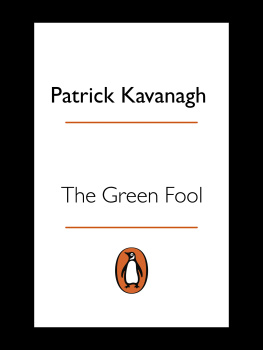
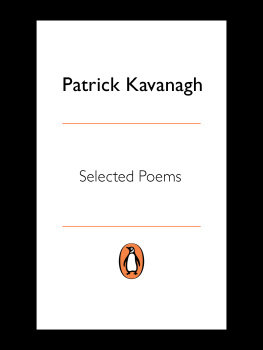
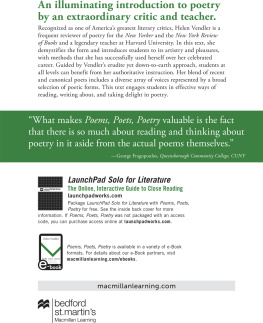
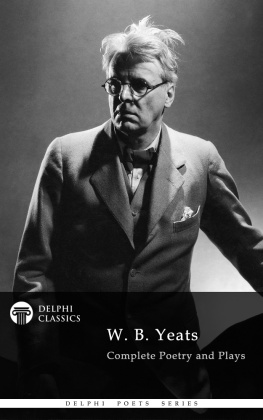
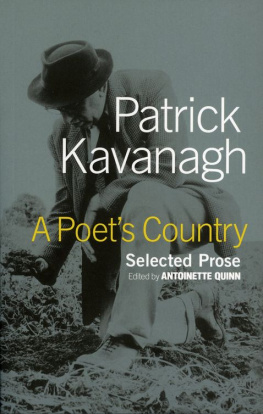
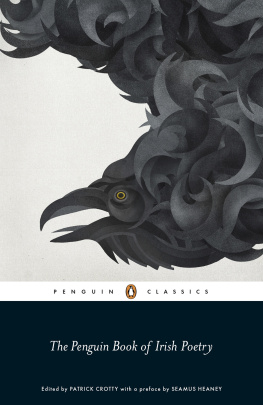
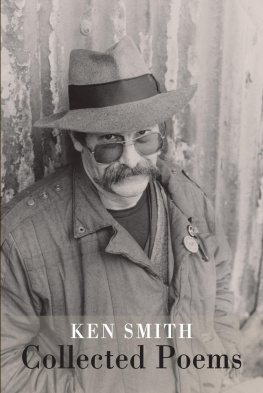

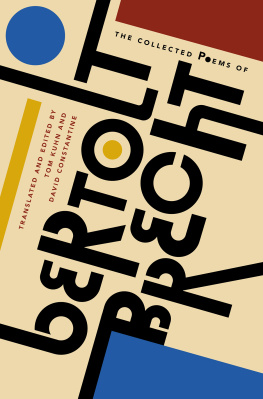
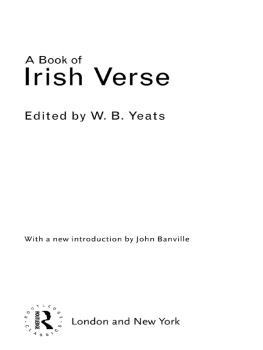
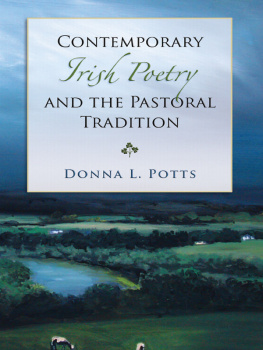
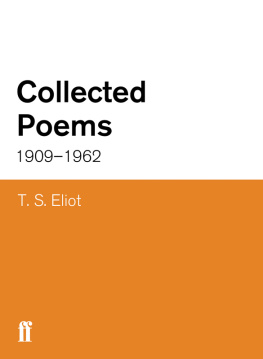
 COLLECTED POEMS PATRICK KAVANAGH was born in Inniskeen, County Monaghan, in 1904. His verse collections included Ploughman and Other Poems (1936), A Soul for Sale (1947) and Come Dance with Kitty Stobling and Other Poems (1960). He also wrote the novel Tarry Flynn (1948) and an autobiography, The Green Fool (1938). He died in 1967. ANTOINETTE QUINN is the author of Patrick Kavanagh: A Biography (2001) and editor of Patrick Kavanagh: A Poets Country, Selected Prose (2003) and of his Selected Poems (1996). PATRICK KAVANAGH
COLLECTED POEMS PATRICK KAVANAGH was born in Inniskeen, County Monaghan, in 1904. His verse collections included Ploughman and Other Poems (1936), A Soul for Sale (1947) and Come Dance with Kitty Stobling and Other Poems (1960). He also wrote the novel Tarry Flynn (1948) and an autobiography, The Green Fool (1938). He died in 1967. ANTOINETTE QUINN is the author of Patrick Kavanagh: A Biography (2001) and editor of Patrick Kavanagh: A Poets Country, Selected Prose (2003) and of his Selected Poems (1996). PATRICK KAVANAGH